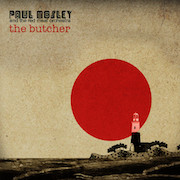There is a story behind The Butcher, but it is not just the one that forms the concept of Paul Mosley’s album. That, in itself, is the foundation of the album, and this review, but it would be remiss of me not to mention the story of Mosley himself. Self-taught and self-trained, the Hartlepool-born singer, songwriter and composer has worked hard to get to the point that The Butcher represents: a climax of a vision long in the making. We are used to stories of singers made good by music schools, vocal training and the Internet, but it is also worth highlighting the evolution of the artist who grows into his or her music, works on it in parallel to the demands of modern life, with its jobs and financial requirements, and still emerges more potent than ever before when all the hard work has relinquished its fragile rewards. Paul Mosley is one such artist. The Butcher is his triumph.
The world of folk has long had its pioneers and adventurers, but such an ambitious project as The Butcher still stands out for its guile and audacity. Oh, how the modern music fan worries at the sight of the words “concept album”, so how might they react to the idea of a “folk opera”? That remains to be seen, but if they turn their ear to the story and music Mosley distills with consummate taste across these 20 songs, they might relax their jaded quill. For The Butcher deserves to be appreciated on its own terms, like Yes’ Close to the Edge or the more outlandish forays of seventies folk duo Mr Fox: this is a world laid bare and inviting, so why not delve into its multifaceted depths?
So what is the story? There’s a lighthouse, a light in the dark, but it has gone out. Hope, light and love die in its extinguishment. The Butcher, a dark and cynical figure who has seen too much of life stares out at the world and decides it is not worth his talents to turn it to the light. But there are those who strive to turn the light back on and illuminate the world with hope. Science or folklore, these are tools to pierce the dark, but will they triumph? Isn’t that the fundamental question of our times? We stand on the precipice of madness, aimed into the dark by names like Trump, Putin, Johnson and Mugabe, and we cling to those who can pierce the veil with logic, love and light. Which will swim to the shores of greatness? I’ll let you delve into The Butcher on your own terms and figure it out for yourself. Even as I overreach, it is a fascinating tale in its own right, resplendent with a panoply of characters and ideas, all of them stuck to the story in a literal sense, but also moving into the ether of interpretation.
Musically, The Butcher is folk at its most expansive, taking in rock, soul (‘A Soul to Save’), Americana (some of the melodies and structures, especially the vocal harmonies, owe more to Gram Parsons than Fairport Convention) and archaic British folk (the very brief “Introducing…” is equal parts Forest and Mellow Candle, underrated bands both). ‘The Butcher’, meanwhile, lurches elegantly between Larks’ Tongues In Aspic-style folk-prog and infectious rock. It splays the title character’s angry soul in full on wings of angry horns and hook-laden riffs, making it both a hit that should be and a darkened folk masterpiece. In contrast, ‘No Hound Dog On Your Trail’, a bit later in the story, sounds from its title like it could be a misplaced rocker but is instead a gloomy but uplifting folk treasure, tapping as it does into the deep recesses of British folklore and its history of phantasmagorical canine spectres.
Paul Mosley explores the potential of a multitude of instruments on The Butcher, but relies most effectively on aching strings, massed acoustic guitars and voices. Of the latter, his emerges most potently, playing a range of characters but always choked with emotion. This is a story, however oblique and open to interpretation, that matters to the singer, and whilst he is blessed to be accompanied by some remarkable musicians, many of whom have amassed plaudits of their own, he strides out at the head of his disparate orchestra, imbuing what could have seemed an abstract concept with feeling and emotion. As news filters to me that The Butcher will become a stage show replete with orchestra and puppet figurines, it takes on fresh imaginary potential and fresh legs.
Paul Mosley is a self-made artist who has made incredible use of the people he has met and his own bright and expansive vision. The frightening thing is that The Butcher may not even be the culmination of said vision, but a step on the way to excelsis. Time will tell, and maybe not all will follow him into the depths of this story, but give its expanse your time, and the darkened lighthouse will start shining brighter than ever, carried by an unique and irrepressible voice.


